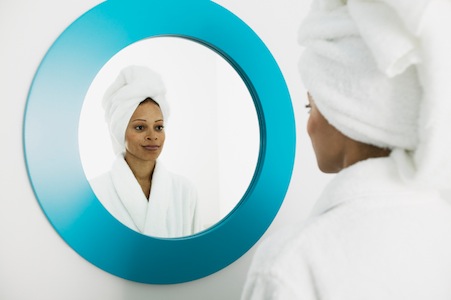It’s hard to speak as admiringly to yourself as you would to your daughter. But it’s a thousand times more important.
Has anyone ever said something so true to you that you couldn’t even fathom a response? Here is what a woman said to me, and its truth was so piercing that it’s still ringing in my ears:
“You know, your daughters are not going to think they are beautiful because you tell them so. They are going to think they are beautiful if you believe in your own beauty.”
Oooh, the nerve.
You know the fretful sigh as you see yourself in the mirror, at the times you do not avert your eyes from it like a Victorian mourner? Stop doing that. Stop bashing at your thighs with an impatient hand when you put on your bathing suit. Stop making hilarious remarks about the state of your thrice-post-partum, dearly departed “abdominals.” And don’t just stop saying it. Stop thinking it, too.
When my girls were little and I was a terrible tyrant about junk food, sometimes I would say “My grandchildren!” and threaten to bore them with the same story, again, about how the cells they were building now would make the milk their own babies drank, years hence. But it was more than preservatives and food coloring that we needed to avoid. Their daughters will be nourished by the sense of beauty in me, that came from my mother, and that I will pass to them.
My grandmother, a belle of the 1920s, bound her generous bosom so she could mimic the wraith-like profile so much in vogue at that time. The poor jugs never recovered, though the style certainly moved on. I don’t know if she told my adorable, ringlet-headed, saucer-eyed mother that she was a beautiful child; I do know she told her she was too skinny as a young girl, and then later made it known that it was a shame my dad had the prettier legs in the couple.
My mother always told me I was lovely, but I can faithfully mimic her grimace as she patted her neck in the mirror while I watched her put her makeup on. She was probably about my age now when she started that squinty neck-pat, and the fretful conversations about the bags under her eyes.
By this point, I have racked up years of “do as I say, not as I do” beauty self-assessment for my girls. Is it too late to change my tune?
Now that I have wiry, unpredictable hairs poking out of my head and neck, now that my belly is not an area of my body so much as an item, independent, that must be hauled up in one hand and dropped down the front of my waistband, now is the time to start believing in my own gorgeousness? Whoa. Let’s slow down a bit.
First, let’s examine my credibility factor. Recently I had to supply a photo of myself for use publicly. It occurred to me that I looked a lot like Karl Malden, or perhaps Jerry Lewis, in this or any photo. This was just an honest, objective assessment.
A friend was in a similar predicament. She produced two gorgeous snapshots of herself, which did not surprise me, because she is gorgeous. “Oh,” she said, truly unhappy, “I take a terrible photo.” This is an unreliable opinion, I said to myself. By which I meant, she is crazy. Because look—she is as gorgeous in this picture as she is in that picture as she is live and in person.
This was my honest, objective opinion.
Wait. How is it that she is crazy, but I am just honest? “You are beautiful!” she said to me. She thinks this because she loves me, I said to myself, understanding immediately that this rendered her assessment less credible.
Hmm.
So that brings us to calculating and adjusting for the love factor. I can’t imagine for one second that I could ever look at my children and see anything but beauty—clean or dirty, rested or exhausted, young or old, the sight of them makes my heart soar and I feel quite sure that it always will. That I love them is inseparable from this (of course) entirely objective assessment, but in no way impacts its credibility. They are always beautiful to me, and, as my little boy reminds me often, I am to them. He thinks I am beautiful, and when I complain about what I see in the mirror, it’s clear that it insults him.
To be alive, really, is to be beautiful, but the daily bombardment of age-defying lip-plumpers modeled by already-perfect-yet-Photoshopped-anyway 20-year-olds makes us forget that beauty has nothing to do with what they are selling.
We tell ourselves we are ugly in the same tone we tell ourselves that we are stupid or a failure because there is really no fundamental difference among these. When you nail the math problem or the lay-up or the metaphor, you don’t care what you look like because you are immersed in what you are capable of. On top of that, you look badass and gorgeous because that luminous, golden core of capability and confidence is beaming right out of you from every angle and curve.
Beauty is absolutely in the eye of the beholder, where it belongs, whether you are looking at your little girl or at yourself in the mirror. Sure, it’s hard to speak as admiringly to yourself as you would to your daughter. But it’s a thousand times more important.
More of Janet’s work can be seen on her blog, A Raisin & A Porpoise. She teaches writing in rural Western Massachusetts, and is a regular contributor to the Berkshire Festival of Women Writers.
Related Links:

